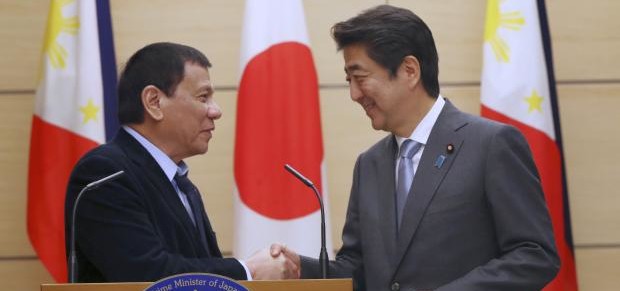No PH-China military alliance, Duterte tells Abe

Philippine President Rodrigo Duterte, left, and Japanese Prime Minister Shinzo Abe shake hands during a joint press conference following their meeting at Abe’s official residence in Tokyo, Wednesday, Oct. 26, 2016. AP
TOKYO—President Duterte on Wednesday assured Prime Minister Shinzo Abe that he struck no military alliance with China and that he would insist on the rule of law in the South China Sea.
Abe, in turn, supported Mr. Duterte’s move to improve ties with China, saying he and the Philippine leader had confirmed the importance to them of the peaceful resolution of disputes in the South China Sea and compliance with the United Nations Convention on the Law of the Sea.
Improving China ties
“In that regard, Japan welcomes the effort of President Duterte visiting China and endeavor to improve and further advance the bilateral relationship between the Philippines and China,” Abe said after a meeting with the visiting President of the Philippines.
Japan is embroiled in a territorial dispute with China, which involves five uninhabited islands in the East China Sea, and has a strategic interest in the maritime disputes in the South China Sea.
Mr. Duterte’s visit to Japan came just days after a four-day visit to China, during which he declared “separation” from the United States, causing worries in the Japanese government and business circles.
Japan is a staunch ally of the United States and hosts 50,000 US troops.
At the start of his meeting with Abe, Mr. Duterte told the prime minister that he would remain an ally of Japan.
‘We stand by you’
“You can rest assured, and I give you my word, that we would stand by you when the time comes,” Mr. Duterte said.
He repeatedly assured the Japanese leader that the Philippines did not enter into a military alliance with China.
Earlier on Wednesday, Mr. Duterte told Japanese businessmen that his visit to China last week was all about economics.
In his meeting with Abe, Mr. Duterte said he would seek a peaceful resolution of the Philippines’ maritime dispute with China in the South China Sea in accordance with international law.
He told Abe that when the time comes for him and Beijing to discuss the dispute, he would cite the ruling of the UN-backed Permanent Court of Arbitration in The Hague that invalidated China’s claim to almost all of the South China Sea.
“Whether we like it or not, someday we’ll have to talk about it and present our side and I said, in front of you, I cannot go out of the arbitral doctrine. I’m limited to what it says,” Mr. Duterte said.
“There were no military alliances, no nothing, only pursuit of trade and commerce,” he added.
Mr. Duterte also said Japan would be a crucial dialogue partner of the Association of Southeast Asian Nations, which the Philippines will chair next year, in efforts to ensure adherence to the rule of law.
Abe and Mr. Duterte agreed to cooperate in promoting regional peace and stability and endorsed Japan’s provision of patrol boats and military training aircraft to bolster the Philippines’ maritime security.
“The two leaders look to their network of friendship and alliances, in particular the ever stronger ties between the Philippines and Japan, to help promote peace, stability and maritime security of the region,” the two leaders said in a joint statement issued after their meeting.
Agreements signed
Japan and the Philippines signed agreements, including Japan’s provision of two coast guard boats and T-90 military trainer aircraft as part of its contribution to step up Philippine maritime security capability.
Japan also agreed to support infrastructure and agricultural promotion projects in the Philippines to help economic development.
Also signed was a memorandum of cooperation between the Ministry of Internal Affairs Communication of Japan and the Presidential Communications Office of the Philippines. —WITH A REPORT FROM AP